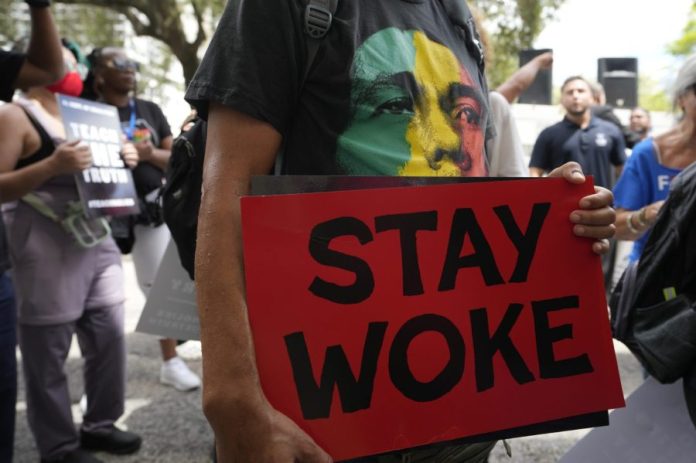
Democrats have a language problem.
Politico recently reported that a Democratic think tank, Third Way, is circulating a memo warning party leaders to avoid 45 words and phrases that make them sound more like campus activists than neighbors.
The blacklist includes such gems as “cisgender,” “radical transparency,” “stakeholders,” “the unhoused,” “systems of oppression,” and “birthing person.” You can almost hear the eye-rolls in diners across America.
I have seen it myself. Sit in on a town hall in Michigan or wander a county fair in Iowa, and you’ll hear people talk in the blunt language of their lives: jobs, schools, bills, crime. Drop a word like “justice-involved individuals” into that mix and you don’t sound compassionate — you sound like you’re speaking through a translator.
Third Way divided its banned terms into categories like “Therapy-Speak” and “Organizer Jargon.” But why stop there? If Democrats need a guidebook, I’m happy to oblige.
Welcome to the Dictionary of Woke (and Other Meaningless Words).
Birthing person
Translation: “Mom.” Unless you’re pitching a dystopian sci-fi series, just say “mother.”
Food insecurity
Translation: “Hunger.” A hungry person wants a sandwich, not a symposium.
Latinx
Translation: “Latino or Latina.” Surveys show that practically no Hispanics use “Latinx.” To most, it sounds contrived and foreign — the opposite of inclusive.
Justice-involved individual
Translation: “Criminal,” or maybe “prisoner.” Speaking of which, whoever introduced this phrase should be locked up in prison for crimes against the English language.
The unhoused
Translation: “Homeless.” Saying the same thing slightly differently doesn’t make it any better, let alone give anyone a roof.
Person who immigrated
Translation: “Immigrant.” Adding two extra words doesn’t make it kinder, just clunkier.
Epistemic violence
Translation: “Disagreeing with me,” which usually doesn’t require medical attention.
Coup / Insurrection (Jan. 6 edition)
Translation: Riot. Nobody mistook the guy in Viking horns for Augusto Pinochet.
Fascist
Translation: “Somebody I don’t like.” The word that once described Mussolini is now applied to the neighbor who parks too close to your driveway.
Reproductive justice
Translation: “Abortion.” If that’s what you mean, just say it. Don’t hide the ball. Euphemisms don’t build trust.
Stakeholders
Translation: “People.” Unless you’re writing a vampire novel, skip the stake.
Cisgender
Translation: “Not transgender.” The word tries to sound scientific but mostly makes people wonder why they suddenly need a label for being ordinary.
Dialoguing
Translation: “Talking.” Nobody “dialogues” at the dinner table.
Centering voices
Translation: “Listening.” It’s not an avant-garde art exhibit, it’s a conversation.
Microaggression
Translation: “Insult.” Sometimes small, often just imagined, but it turns out we had a real word for this all along.
Overton window
Translation: “What’s considered normal.” You don’t need a window to see it.
Bodies (as in “Black and brown bodies”)
Translation: “People.” Ironically, it sounds less human, not more.
Cultural appropriation
Translation: “Borrowing.” Sometimes it’s tasteless, but sometimes it’s just salsa night.
Lived experience
Translation: “Experience.” As if there were another kind.
My truth
Translation: “How I feel.” Which is fine — but let’s not confuse it with “the truth.”
The problem shows up most vividly in abortion debates. Democrats’ talk of “birthing persons,” “pregnant people,” and “reproductive justice” may please activists, but to most voters it sounds contrived. Even the word abortion itself often gets avoided, replaced by softer euphemisms like “choice” or “reproductive health care.” If you’re going to advocate for abortion, at least have the courage to say the word.
And in truth, even “abortion” can be seen as its own euphemism — a clinical, bloodless label that obscures the reality of what it entails.
Politicians have been playing these word games forever. George Orwell saw it clearly when he warned that “Political language is designed to make lies sound truthful and murder respectable, and to give an appearance of solidity to pure wind.”
Third Way’s memo may be awkward, but it’s also a healthy sign. At least some Democrats understand that words matter — and that the ones they’ve been using are a liability. Republicans could use a similar reminder, because, in fairness, they have their own dictionary of the weird:
Woke
Translation: “Something I don’t like.” The Swiss Army knife of insults, now too dull to cut.
Cancel culture
Translation: “Boycott.” Americans have been canceling things since the Boston Tea Party.
Deep state
Translation: “Government bureaucracy I don’t trust.”
Fake news
Translation: “News I don’t like.” Overused to the point of parody.
Illegal aliens
Translation: “Illegal immigrants.” One is plain English, the other sounds like they came from Mars.
RINOs
Translation: “Moderate Republicans.” Not an endangered species, just colleagues you disagree with.
Groomer
Translation: “Political opponent I want to smear.” A reckless insult that diminishes real concerns about child safety.
War on Christmas
Translation: “People saying Happy Holidays.” Don’t worry, Jesus was still born on that day no matter how they say it, and Hallmark is still doing just fine.
Globalists
Translation: “Anyone who believes in international cooperation.” It’s often used like a slur.
Family values
Translation: “My values.” Often invoked right before a salacious scandal.
Both parties cling to words that rally the faithful but repel everyone else. It’s rhetorical junk food: cheap, salty, and unsatisfying. And voters can tell when they’re being force-fed.
Politicians don’t need the jargon of therapists or culture warriors; they need the voice of a neighbor. Imagine if more took the Plain English pledge: no “equity frameworks,” no “deep state.” Voters don’t need a glossary, they just need politicians to speak human. In politics, the shortest words are usually the truest.
Daniel Allott is the former opinion editor of The Hill and the author of “On the Road in Trump’s America: A Journey into the Heart of a Divided Country.”

